Best Management Practices & Tools
- Escaped Trash Risk Map
- Curbside Disposal Education Campaign Pilot: Summary and Case Study Report
- Region 8 Trash Free Waters Tribal Program Handbook
- Aquatic Trash Prevention Information and Resources for Stormwater and Solid Waste Practitioners
- EPA's Microplastics Beach Protocol
- Trash Stormwater Permit Compendium
- EPA's Escaped Trash Assessment Protocol (ETAP)
- National Great Practices Compendium
- Atlas of Gulf States Litter Control Policy and Programs
EPA seeks to share effective management practices, policies and programs that can reduce the overall volume of trash generated or prevent trash from entering the aquatic environment.
Escaped Trash Risk Map
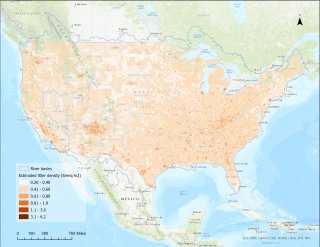
The EPA's Trash Free Waters program has mapped estimated escaped trash density on land and at risk of getting into waterways in its newly released Escaped Trash Risk Map, which displays trash density across the United States as of September 2024.
The resolution of the map shows estimated escaped trash counts at the one square kilometer level. Estimated escaped trash counts, item types and material type distribution are viewable for each U.S. river basin. To gauge the risk of escaped trash entering waterways, areas that intersect floodplains can also be viewed. The escaped trash density estimates serve as a ‘risk map’ of what escaped trash is estimated to be on the ground and at risk of getting into waterways. The model does not account for illegal dumping, street sweeping, cleanup efforts or other local factors.
Locations and summary data on microplastics in freshwater systems across the U.S. are also displayed in the map. Data are insufficient to estimate microplastic concentration in all U.S. waterbodies.
- View the Escaped Trash Risk Map
Curbside Disposal Education Campaign Pilot
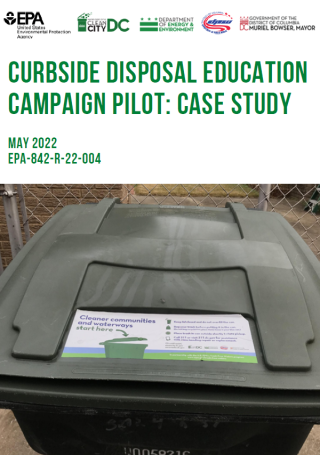
The Curbside Disposal Education Campaign Pilot took place from July 2020 to May 2021 in Washington, D.C., through a partnership between the EPA’s Trash Free Waters Program (TFW) and the local District government. The primary goal of this initiative was to educate District residents about proper waste containment and encourage behavioral changes to reduce unintentional leakage associated with curbside municipal trash collection. A total of 8,000 D.C. DPW-serviced, single-family homes in four target neighborhoods were selected to receive a campaign sticker that articulated four concise actions. The below comprehensive case study report was developed to provide details on project scope, data collection methodology, key findings, and recommendations for future efforts.
- View the Curbside Disposal Education Campaign Pilot: Summary (pdf) for a quick overview of key takeaways from the pilot project.
-
View the Curbside Disposal Education Campaign Pilot: Case Study Report (pdf) for a more thorough deep-dive into the methodology, findings, and recommendations of this pilot campaign to better inform the successful adaptation and adoption of a similar approach in other interested communities.
Region 8 Trash Free Waters Tribal Program Handbook

The Trash Free Waters team in EPA's Region 8 office (which covers Colorado, Montana, North Dakota, South Dakota, Utah and Wyoming) has developed a handbook to assist Tribal governments, Indigenous communities, and other relevant stakeholders to develop and implement projects that reduce trash in waterways on Tribal lands. While there is no one-size-fits-all solution to trash pollution, this handbook provides basic information on project design, implementation, and funding to serve as a starting point for those interested in taking action to reduce escaped trash in their community. This resource was developed specifically for Region 8 Tribes, but much of the information related to project development and funding opportunities may be helpful to tribal and other communities outside of Region 8 as well.
Aquatic Trash Prevention Information and Resources for Stormwater and Solid Waste Practitioners

In 2021, EPA Trash Free Waters, in collaboration with the National Municipal Stormwater Alliance (NMSA), KCI Technologies, and the American Chemistry Council (ACC), held three stakeholder dialogue sessions to identify major challenges that municipal stormwater and solid waste departments face when trying to more effectively address the issue of trash in waterways. These meetings brought together leading stormwater and solid waste professionals from cities and towns across the U.S.
Following these meetings, the project partners compiled an inventory of existing resources and information that municipalities might find helpful, given the types of challenges that they tend to have in common. For each of the four major challenges identified, the inventory includes several potentially useful reports, tools, and databases that are currently available for public use. The comprehensive summary report sharing what was learned from the three stakeholder meetings is available on the National Municipal Stormwater Alliance website.
EPA's Microplastic Beach Protocol
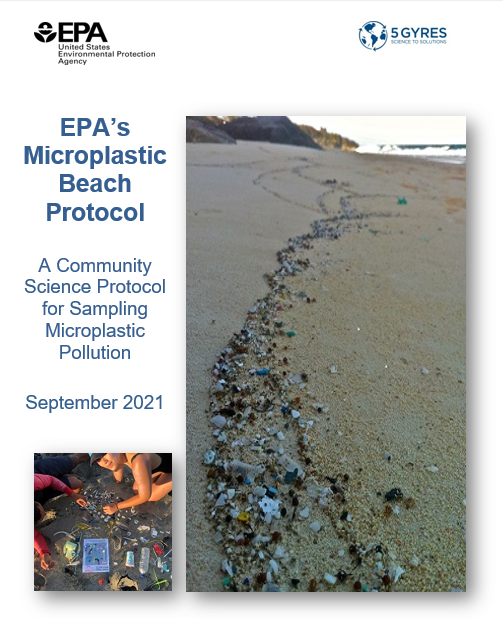
The EPA’s Microplastic Beach Protocol was designed to help community scientists collect data on microplastic pollution along both freshwater and marine beaches and shorelines. Using this protocol, volunteers can collect important data that can be used to characterize current levels of microplastics pollution and look for local, regional, and global trends. The protocol was originally developed by the 5Gyres Institute and has since been updated and revised by the EPA.
Users are able to access a mobile version of the EPA’s Microplastic Beach Protocol via the Marine Debris Tracker app.
This document provides an introduction to microplastics, an outline of how to collect and analyze samples using the protocol, and instructions for using the Marine Debris Tracker app to log data.
Trash Stormwater Permit Compendium
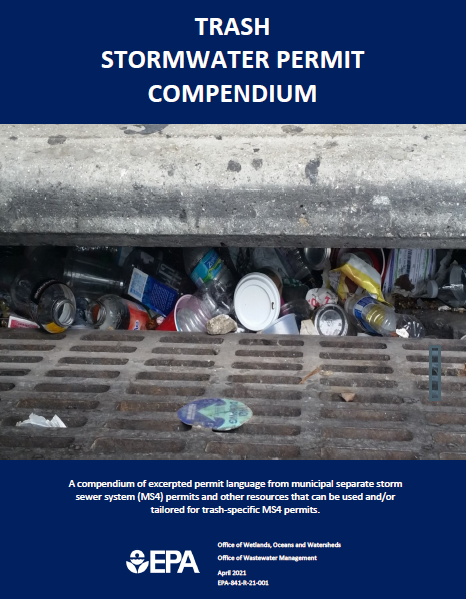
The Trash Stormwater Permit Compendium is one in a series of documents developed by EPA as a resource for stormwater permit writers.
The purpose of this compendium is to provide Phase I and Phase II Municipal Separate Storm Sewer System (MS4) permit writers with tools and information they can use in developing trash-related provisions for MS4 permits.
The Trash Stormwater Permit Compendium is also a useful tool for stormwater management planners, watershed planners, and others interested in how to insert effective trash measures into their planning documents.
Escaped Trash Assessment Protocol (ETAP)
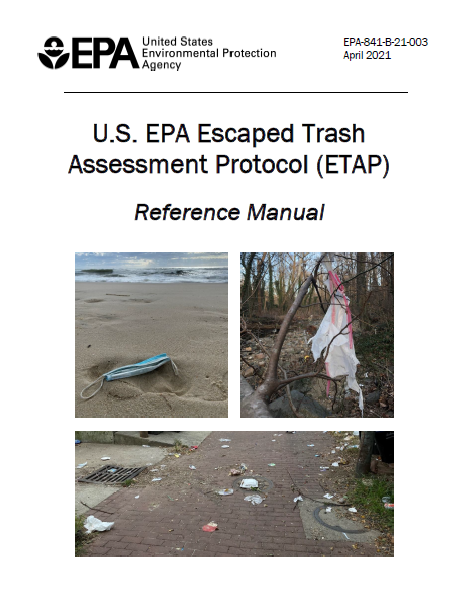
The Escaped Trash Assessment Protocol (ETAP), developed by the U.S. Environmental Protection Agency's Trash Free Waters program, is a quantitative survey tool which provides a standard method for collecting and assessing litter data.
The protocol is designed to be applied to a broad range of site types— e.g., parks, streets, parking lots, etc. — and environmental conditions — e.g., various hydrological and climatic regimes. This highly adaptable method for trash monitoring will provide practitioners and citizen scientists with a comprehensive and rigorous method for quantifying trash loadings. The tool can also be used to assess item age and level of fouling and analyze and compare across specific material types and categories of trash collected. This information can eventually be used to guide upstream source reduction decisions.
- View the ETAP Reference Manual and ETAP Excel Spreadsheet Tool
- ETAP now available on Marine Debris Tracker app
National Great Practices Compendium
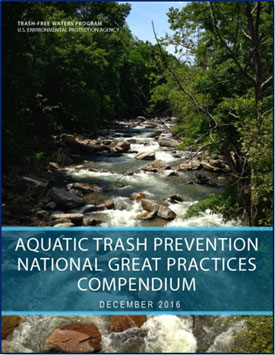
The National Great Practice Compendium highlights outstanding activities, technologies, and programs that prevent trash from entering the aquatic environment and/or reduce the overall volume of trash that is generated.
An activity qualifies as a Great Practice if it achieves measurable progress towards its trash prevention and/or reduction goals and shows a clear return on investment from such efforts. Results must be measurable and achievable.
This compendium serves as a reference tool for Great Practices that show real results. The Trash Free Waters program developed this resource after hearing from many stakeholders that they needed better information on “what works.” The Great Practices that are highlighted can help civic leaders and others make informed decisions about their future trash prevention program investments based upon the successes of others.
Atlas of Gulf States Litter Control Policy
and Programs
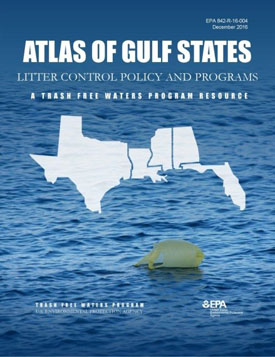
The Gulf Atlas is a compendium of state and local policies and programs that reduce and prevent aquatic trash, as well as the related enforcement mechanisms that support them.
The Trash Free Waters program developed the Gulf Atlas to address a strong stakeholder request for information on programs that are addressing this issue.
The Gulf Atlas facilitates collaboration and information-sharing among state and municipal governments and other interested groups.
Marine Debris Campus Toolkit
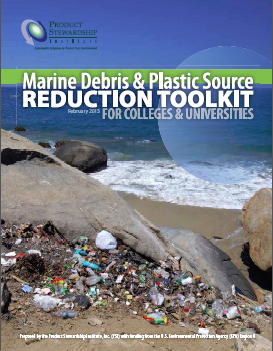
EPA, the Product Stewardship Institute, and the University of California collaborated on a Marine Debris & Plastic Source Reduction Toolkit for Colleges & Universities to help college campuses and other institutions cut their plastic waste, to help reduce marine debris and coastal pollution. The toolkit, funded by an EPA grant, resulted from a successful two-year pilot project by the Product Stewardship Institute at three coastal University of California campuses: UC Santa Barbara, UC San Diego, and UC San Francisco.
During the two-year project, all three UC campuses dramatically reduced their consumption of plastics. UC Santa Barbara saw a 97% decline in plastic bag use by campus food services through an agreement with their local Subway store to eliminate unnecessary packaging. By promoting campus hydration stations, the campus also eliminated over 60,000 single-use plastic water bottles. UC San Diego reduced plastic bag use by more than a million bags each year, working with their campus Subway restaurant to eliminate plastic bags and straw sleeves. UC San Francisco’s Parnassus and Mission Bay campuses retrofitted more than 50 water fountains with gooseneck spouts to fill reusable water bottles, cutting campus purchasing of single-use plastic water bottles by 50%, and saving $27,500 each year.
- A Footprint Calculator to determine a campus’ "plastic footprint"
- A source reduction plan to eliminate the use of disposable plastic items
- Changing campus purchasing practices by switching to greener, lower-waste products, and
- Establishing campus-wide plastic waste reduction policies.
